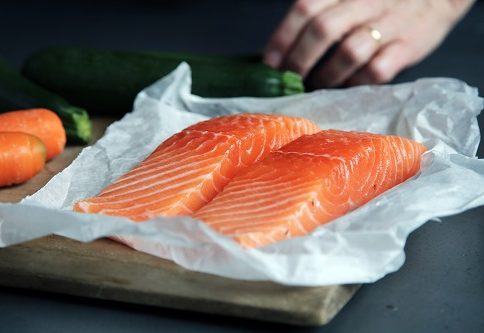Protein First: Our Favorite Sources of Protein to Keep You Full and Satisfied
 After bariatric surgery, patients who follow recommendations regarding food choices and regular activity are most successful in their weight-loss pursuits. While dietary recommendations may vary somewhat depending on individual differences among patients, certain guidelines are encouraged for most patients. Among the most important of these guidelines are avoidance of refined and processed foods and consuming adequate protein intake. Clinical research indicates that patients who are compliant with protein intake recommendations following their weight-loss surgeries generally lose more weight, decrease their BMI more extensively, and increase their lean mass more than those patients who do not eat adequate amounts of protein (Raftopoulos et al. 2011).
After bariatric surgery, patients who follow recommendations regarding food choices and regular activity are most successful in their weight-loss pursuits. While dietary recommendations may vary somewhat depending on individual differences among patients, certain guidelines are encouraged for most patients. Among the most important of these guidelines are avoidance of refined and processed foods and consuming adequate protein intake. Clinical research indicates that patients who are compliant with protein intake recommendations following their weight-loss surgeries generally lose more weight, decrease their BMI more extensively, and increase their lean mass more than those patients who do not eat adequate amounts of protein (Raftopoulos et al. 2011).
Why are High-Protein Foods Helpful in Weight Loss?
Protein is an important macronutrient in all diets. However, it can be particularly helpful for people who want to achieve weight-loss because protein contains fewer calories per gram than other macronutrients and is processed more slowly by the body. This generally translates to patients consuming fewer calories while feeling fuller when eating a high-protein diet. Additionally, weight loss patients sometimes struggle to maintain their lean muscle mass when they are losing weight; eating plenty of protein prevents muscle loss and can speed healing while supporting weight loss efforts (Beebe & Crowley 2015).
How Much Protein do I Need and When Should I Eat It?
Guidelines on protein intake vary somewhat based on individual patient considerations, but generally, you should plan to consume a minimum of 60 grams per day. Throughout your experience with the Chicago Institute of Advanced Bariatrics, you will have nutrition support and guidance. You will also be provided with very specific post-surgery recommendations, so you will know exactly the target you are aiming for with your protein intake after your procedure. You will likely want to eat some protein as part of every meal to help you meet your targets and stay satiated between meals. You should also always eat your protein first – even before fruits and vegetables! By eating the protein portion of your meal first, you ensure that you are able to meet your protein requirements before you fill up on other foods.
What are the Best Sources of Protein?
Protein powders may be a good option for you, and there are many high-quality protein supplements on the market. While not every one of these options are appropriate for every patient, listed below are our favorite protein-rich foods that make great choices after bariatric surgery:
- Lean Meats and Chicken: Perhaps the most well-known sources of protein are lean meats (beef and pork) and chicken. They have very high protein content (up to 80% protein). Be sure to choose a cut of meat or piece of chicken that fits within your fat intake recommendations, as some cuts are fattier than others.
- Fish and Shrimp: Fish and shrimp also have a high protein concentration, and most have less cholesterol than other meats.
- Eggs and Dairy: These animal products have quite a bit of protein, but can also contain higher amounts of fat. The fat can be reduced by using egg whites only or purchasing low-fat dairy products. When choosing low-fat dairy options, such as yogurt, be sure to examine the sugar content, as many low-fat products have added sugars that you should avoid.
- Beans and Other Legumes: In addition to ample protein content, beans are relatively high in fiber, which contributes to a longer-lasting feeling of fullness. Additionally, bean curd products, such as tofu, are also great sources of protein and very versatile. Hummus (a chickpea-based food) is great as a dip or used as a spread in place of high-fat options, such as mayonnaise or cream cheese.
- Nutritional Yeast: Used most often as an additive, this deactivated yeast can be sprinkled on most foods to give them a nutritional boost. Many use this option in place of cheese sprinkled on salad and other dishes to enhance flavor and protein content while avoiding additional fat.
References
Beebe, M.L., & Crowley, N. (2015). Can Hypocaloric, High-Protein Nutrition Support Be Used in Complicated Bariatric Patients to Promote Weight Loss? Nutrition in Clinical Practice. 30(4): 522-9.
Raftopoulos et al. (2011). Protein intake compliance of morbidly obese patients undergoing bariatric surgery and its effect on weight loss and biochemical parameters. Surgery for Obesity and Related Diseases. 7(6):733-42.
